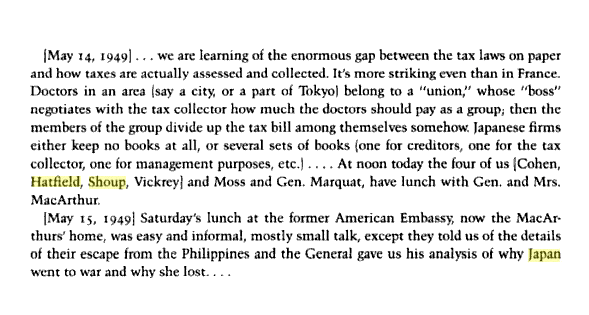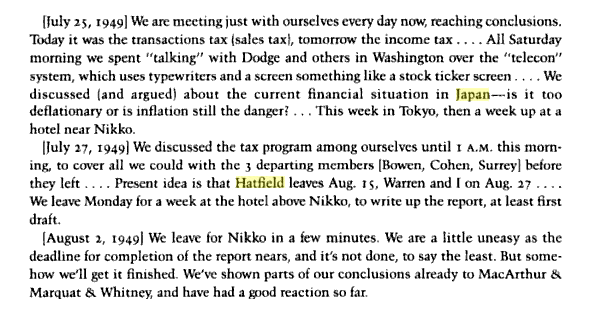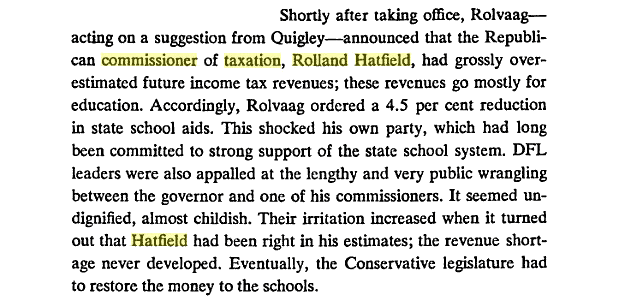|
|
March 1935 B. A. University of Chicago
December 1935 M.A. University of Chicago (in absentia)
1935 - 1938 University of Minnesota Graduate School
1935 - 1942 Assistant Professor of Economics and Business Administration, College of St. Thomas, St. Paul, MN
1942 - 1946 United States Air Corps (Major)
1945 - 1946 Member of General MacArthur's staff with responsibility for inventoring the Emperor's property in Japan
1947 - 1951 (Governor: Luther W. Youngdahl, Commissioner of Taxation: G Howard Spaeth)
Served as Director of Tax Research (1946 - 1952)
[As an aside, the wife of G. Howard Spaeth after 1970, was Eva Lindbergh Christie Spaeth, the sister of Charles A. Lindbergh. We visited with them on occasion]
Biography of Eva Lindbergh Christie Spaeth, 1892�1985
(Reprinted from the Minnesota Historical Society)
Eva Lindbergh, daughter of Mary LaFond and Charles August Lindbergh, was born in Little Falls in 1892. She graduated from Carleton College in 1914, after which she taught school in Akeley, Minnesota. From 1914 to 1916 she worked in her father's congressional office. In 1916 she married George West Christie and the couple moved to Red Lake Falls, Minnesota where they edited and published the Red Lake Falls Gazette. Together they had two children: George Christie and Lillian Christie Johnson. George Christie, Sr. died in 1956. After his death and until 1968, Eva continued to publish the paper. On June 6, 1970 she married G. Howard Spaeth, who had been the Minnesota commissioner of taxation. Eva died on January 28, 1985.
Apr 1949 - Aug 1949 Shoup Mission to Japan
Tax Reform in Developing Countries By Malcolm Gillis
In 1949, an aide to Gen. Douglas MacArthur invited Professor Shoup to Japan to help overhaul the tax system. Japan had adopted both corporate and individual income taxes in the late 19th century, but Professor Shoup, in a tour of the country by private railcar, heard complaints that the system was arbitrary, with some people heavily taxed while others paid little.
To remedy this, he and six other economists, a team that became known as the Shoup Mission, proposed a system under which companies that kept detailed records and filed an annual tax report would be free of onerous audits and could take advantage of various tax breaks, including generous allowances for the depreciation of equipment and the ability to carry losses in bad years forward to offset taxes during highly profitable years.
Professor Shoup had the forms printed in blue, after being advised that the Japanese liked blue documents, as part of his attempt to encourage voluntary compliance. The Japanese Parliament enacted his proposals in 1950. Companies that participate in the system belong to the National Federation Blue Tax Form Association in Japan.
Beyond creating a friendlier tax agency, the Japanese system also eliminated the need for about 80 percent of Japanese to file an individual income tax return, because taxes withheld from paychecks settle obligations to the national, prefecture and municipal governments.
Report on Japanese Taxation by the Shoup Mission,
General Headquarters, Supreme Commander for the Allied Powers, Tokyo Japan, September 1949.
Volume I. - IV.
FOREWORD
The present report on the Japanese tax system is submitted to the Supreme Commander for the Allied Powers, at whose request the Tax Mission was formed.
The chief aim of our mission has been to draw up a plan of a permanent tax system for Japan. Emphasis has therefore been placed on considerations that go beyond the financing problems of the present and the coming fiscal year. Nevertheless, we have found it necessary to specify in some detail how our recommendations affect the 1949-50 and 1950-51 budgets. The long-term program must be of a kind that can be put into force without endangering the stabilization recently achieved with the aid of the recommendations made in the spring of 1949 by the Dodge Mission.
The long-term program itself could have been either of two kinds. We could have recommended a rather primitive type of tax system, one which would depend on external signs of income and wealth and business activity, not on carefully kept records and intelligent analysis of difficult problems. Such a system could raise the required revenue, but it would perpetuate gross inequities among taxpayers, dull the sense of civic responsibility, keep the local governmental units in uneasy financial dependence on the national government, and give rise to undesired economic effects on production and distribution. Moreover, we soon became convinced that the current difficulties in obtaining fair and efficient administration of the tax laws, and a high degree of compliance by the taxpayer in Japan need not be taken as inevitable. Our aim therefore has been to recommend a modern system, which depends upon the willingness of business men and all taxpayers of substantial means to keep books and to reason carefully about some fairly complicated issues of equity. For the small taxpayer, at the same time, the task of filing returns and paying the tax should be kept a simple one. Under this approach, we see no reason why Japan may not within a few years, if she so desires, have what would be the best tax system in the world. In any event, the consistent aim of this report has been to keep open the road that may lead to that goal.
What we are recommending here is a tax system, not a number of isolated measures having no connection with one another. All of the major recommendations, and many of the minor ones, are interconnected. If any of the major recommendations are eliminated, some of the others will thereby become of less value, or even harmful. Consequently, we disclaim responsibility for the results that may follow the adoption of only part of our recommendations. For example, we have devised a tax system that avoids the double taxation of corporate income under the national income taxes, and at the same time blocks permanent tax avoidance. Among the essential parts of this system are the full inclusion of capital gains and the full deduction of capital losses, with permission to spread the gain over a series of years, and with exemption of large capital gains that are due merely to a change in the value of money. If capital gains and losses were to be included not in full but under some percentage plan like that now in effect, our set of recommendations for corporation and individual income taxes would have to revised extensively.
Members of our group arrived in and departed from Japan at different dates from April to September, 1949, devoting as much time to this task as their previous commitments in the United States allowed. In general, the mission spent about four months on the study. May and June were occupied largely in discussions with taxpayers, tax officials (national, prefectural and municipal) and others. Much of the information was obtained outside of Tokyo, on field trips throughout Japan from Hokkaido to Kyushu. Lack of space forbids specific acknowledgement to the scores of individuals who have so generously given us information and suggestions in the course of these discussions. However, we wish to note our special indebtedness to Major General William F. Marquat, Chief, Economic and Scientific Section, GHQ; Mr. Harold Moss, Chief, Internal Revenue Division, Economic and Scientific Section; the Minister of Finance, Mr. Hayato Ikeda, and his staff, particularly Mr. Keiichiro Hirata and Mr. Sumio Hara; the professors of public finance who served as official advisers to the mission, Professor Hanya Ito, of Tokyo University, Professor Saburo Shiomi, of Kyoto University, and Professor Shigeto Tsuru, of Tokyo Commercial University; and Mr. Genichi Akatani, of the Foreign Office, Japanese Government. We also extend our thanks to all the others who assisted us, including the many taxpayers whose letters were helpful in listing defects in the tax system.
The recommendations in this report are those of the tax mission, and no one in GHQ or the Eighth Army, or in the Japanese Government, is in any way responsible for them. We have attempted to adapt the recommendations to the needs of the various sections and divisions in GHQ, the officials of each of which have their own set of difficult problems to face, and who have nevertheless gone to considerable lengths to find a solution acceptable from all points of view. But the responsibility for this report attaches to us alone.
All the members of the tax mission are in substantial agreement on the main conclusion of this report, but, owing to the necessarily differing times of departure from Japan, the report in its final form was seen only by Shoup, Vickrey, and Warren; the other members should therefore not be held to the same degree of responsibility for all of the recommendations. The members of the tax mission, and their professional connections, are as follows: Dean Howard R. Bowen, College of Commerce and Business Administration, University of Illinois; Professor Jerome B. Cohen, Department of Economies, College of the City of New York; Mr. Rolland F. Hatfield, Director of Tax Research, Department of Taxation, St. Paul, Minnesota; Professor Carl S. Shoup, School of Business and Graduate Faculty of Political Science, Columbia University, (Director of the Tax Mission); Professor Stanley S. Surrey, School of Jurisprudence, University of California, Berkeley, California; Professor William Vickrey, Graduate Faculty of Political Science, Columbia University; and Professor William C. Warren, School of Law, Columbia University.
The Japanese translation was made under severe limitations of time, while the English text was undergoing some last-minute revisions. In the event that any discrepancy is found, the English text should be the one used.
Carl S. Shoup
Tokyo
August 27,1949.
[excerpted notes by Carl S. Shoup, from Gillis, Op. cit. p179, 226, & 232]



1952 L.L.B. William Mitchell College of Law, St. Paul, MN; Admitted to Minnesota Bar
1952 - 1961 Northwestern National Life Insurance Company, Mpls MN
Assistant to the President (1952 - 1953)
Worked as Manager, Pension and Tax Department (1953 - 1961)
1961 - 1963 (Governor: Elmer L. Andersen)
Appointed and Served as Commissioner of Taxation (May 1, 1961 - 1963)
Wikipedia (http://en.wikipedia.org/wiki/Elmer_L._Andersen):
In 1960, the year Minnesota helped elect John F. Kennedy to the Presidency and re-elected Senator Hubert H.
Humphrey, Elmer ran for governor, winning by more than 20,000 votes. During his term, the common loon became
the Minnesota state bird, several state parks were established, the Taconite Amendment was passed, as was Fair
Housing legislation.
During his term as governor, the current Commissioner of Taxation retired and Elmer L. Andersen chose Rolland F. Hatfield to serve the remainder of that term.
At the time of the next election, Karl Rolvaag accused Elmer Andersen of using sub-standard materials and methods in the construction of the Federal Interstate Highway I-35. Although Andersen was eventually cleared of this accusation it was not before the next election.
Wikipedia (http://en.wikipedia.org/wiki/Elmer_L._Andersen):
He [Andersen] lost his reelection bid two years later in the closest margin ever in United States history.
The election was held on November 6, 1962 but the results were not known until March 21, 1963. After recounts
and court challenges, it was determined that then-Lieutenant Governor Karl Rolvaag had defeated Andersen by 91
votes out of nearly 1.3 million cast. Rolvaag collected 619,842 votes to Andersen's 619,751.
Although Andersen lost his bid for re-election, by the time the recount process had been completed, Rolland F. Hatfield had been re-appointed and re-confirmed. This denied the incoming governor the opportunity of making that appointment.
1963 - 1967 (Governor: Karl Rolvaag)
Served as Commissioner of Taxation (1963-1967)
The Twenty-First Ballot: A Political Party Struggle in Minnesota By David Lebedoff ©1969

1967 - 1971 (Governor: Harold LeVander)
Served as Commissioner of Administration (1967-1971)
1971 - 1976 (Governor: Wendell R. Anderson)
Elected as State Auditor (1971-1975)
In 1974 we were introduced to terms like "Watergate Scandal."
Wikipedia (http://en.wikipedia.org/wiki/Richard_Nixon):
In the face of likely impeachment for his role in the Watergate scandal, Nixon resigned on August 9, 1974. He was later pardoned by his successor, Gerald Ford, for any federal crimes he may have committed while in office.
In a tantrum-like display of frustration, a nervous 1975 electorate removed incumbents from office all across the United States simply because they were affiliated with the Republican Party.
Rolland F. Hatfield was no exception. He was replaced by a 26-year-old with virtually no experience who, when later elected to the office of Minnesota State Treasurer, rewarded Minnesota voters and taxpayers by running the office from Florida.
|
|




